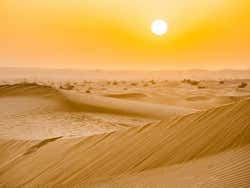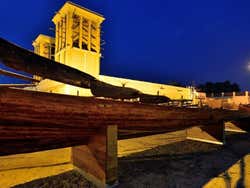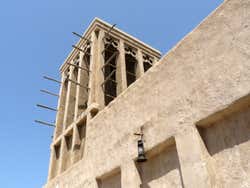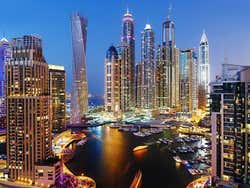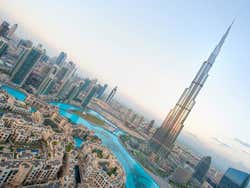
History of Dubai
Discover Dubai’s past here. The city we see today has a very brief history, begging life as a fishing settlement in the 18th century.
Excavations in Hatta, Al Qusais, and Jumeirah indicate that this area was inhabited up to 3000 b.c. However, the city that stands there today wasn't born until 1833 when the Al Bu Falasah tribe, headed by the Maktoum family, separated from Abu Dhabi and settled in the surroundings of Dubai Creek, a 6-mile saltwater river. Prior to this Dubai had been a tiny fishing settlement.
The people here supported themselves through the raising of animals, collecting dates, fishing, and diving for pearls.
The economy of Dubai started to take off in 1894 when Sheikh Saeed Al Maktoum strengthened commerce by granting full tax exemption to all foreign traders. One of the main products that put Dubai on the world map was Pearls.
Early 20th Century
At the beginning of the last century, Dubai started to grow slowly. Initially, the population centered around Bur Dubai and Deira but later started to expand.
Since its beginnings, Dubai had strong ties to trade. In 1908 there were already 350 specialist shops in existence in Deira and 50 in Bur Dubai. The concentration of them caused them to merge into the souk marketplaces that we find there today
The Grand Mosque was built in 1900. In its first years, it also served as a school devoted to the study of the Qur'an.
World War II
In the 1930s Dubai suffered the effects of the Great Depression. Then during the 2nd World War between 1939 - 1945 the country lost much of its trade connections. The pearl industry by this time had practically collapsed and much of the region was in abject poverty. There were waves of unrest and political instability, and there was even an attempt to overthrow British rule and Al Maktoum.
In the 1958 Rashid bin Saeed Al Maktoum became leader and was responsible for turning Dubai into the modern economic powerhouse that we see today. Dubai began trading in gold and Dubai Creek was drained and turned into a major international port.
The era of oil
The 1960s marked Dubai's awakening. The hard work of previous decades came to fruition with the discovery of petroleum in 1966.
By the end of the 1960s, all the infrastructure was in place for the city to expand rapidly - roads, bridges, electricity and water networks, a good telecommunications system and the airport.
In 1969 the first exportation of oil was made, thereby securing its place on the international commercial map. At this point, the relatively new city already had around 60,000 inhabitants.
The 1970s
Dubai underwent huge growth during the 1970s. By 1977 the number of inhabitants had already passed 200,000. In other words, the population had quadrupled in the space of ten years.
The high price of oil allowed Al Maktoum to start planning what would become the city as we know it today. At the end of the decade the Jebel Ali port, World Trade Center, and the Garhoud bridge were already in existence.
The United Arab Emirates were formed in 1971 following Britain's departure from the region. Six emirates joined together including Dubai and Abu Dhabi. A year later a seventh would be added. In the negotiations, Dubai and Dhabi ensured that they would control the majority of the Emirates and that remains the case today.
End of the 20th Century
From the 1980s onwards Dubai was an economic powerhouse. The airport was expanded to accommodate the recently established Emirate Airlines, sports and recreation facilities were constructed and tourism was considered as a source of additional income. In this era, new oil sites were discovered in the Margham desert.
The 1980s were also marked by an urban development boom driven by the huge population growth. By 1990 the city was home to 550,000 inhabitants.
In 1990 Sheikh Rashid bin Saeed died and his son inherited the seat of power. His plans for the city were even more ambitious than those of his father and gave rise to what we know Dubai is today.
The present-day economy
Thanks to the efforts of the government, oil is currently only responsible for 20% of the economy. It is actually business and services, such as tourism, which dominate the economy.
Dubai's policy of tax exemption has meant that many large organizations and businesses now consider Dubai as their base of operations.
